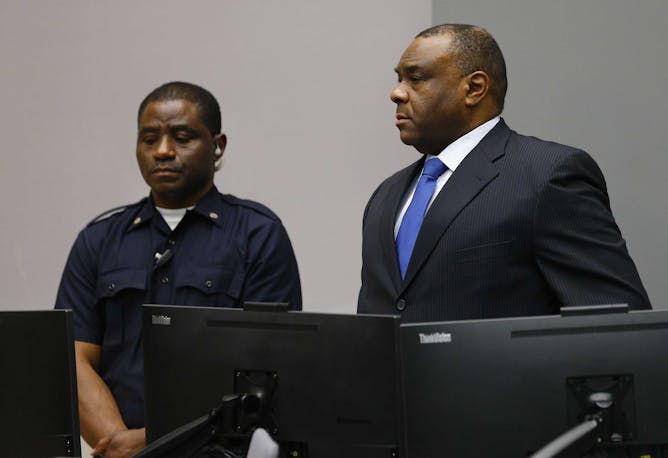|
In a narrow judgment, and one that stunned observers, the International Criminal Court’s appeals chamber has acquitted Jean-Pierre Bemba two years after it sentenced him to 18 years’ for his role, as military commander, for atrocities committed in Central African Republic. The 2016 judgment was seen as an important step towards the “more just world” the ICC pursues. Kerstin Carlson explains the significance of the acquittal.
Over a million children die every year from diseases that can be prevented by vaccines. The reason for this is that vaccines need to be kept cold to remain effective. But a shortage of power supplies makes this difficult if not impossible in many places around the world, hampering mass vaccination campaigns. Jackson Thomas, Gregory Peterson, Mark Naunton, Sam Kosari and Yap Boum set out how this gap can be narrowed.
|

Jean-Pierre Bemba Gombo (right) in the ICC courtroom during his trial in 2016.
EPA/Michael Kooren
Kerstin Carlson, University of Southern Denmark
Sexual violence, a staple of war, has long been absent from international criminal law’s charge sheets.
|

Shutterstock
Jackson Thomas, University of Canberra; Gregory Peterson, University of Tasmania; Mark Naunton, University of Canberra; Sam Kosari, University of Canberra; Yap Boum, Mbarara University of Science and Technology
Vaccines need to be kept cold to remain effective. A lack of power in remote areas makes this difficult, reducing the reach of the life-saving pharmaceuticals.
|
Environment + Energy
|
-
Lucy Rodina, University of British Columbia; Kieran M. Findlater, University of British Columbia
Cape Town faced down "Day Zero" earlier this year, but that doesn't mean its water system is resilient. Other cities should also take note.
|
|
Business + Economy
|
-
Bernelle Verster, University of Cape Town; Cheri-Leigh Young, University of Cape Town; Francois Steenkamp, University of Cape Town; Jennifer Lee Broadhurst, University of Cape Town; Sue Harrison, University of Cape Town
The devastating impact of mine closures could be avoided with economic and scientific interventions.
|
|
Arts + Culture
|
-
Quentin Williams, University of the Western Cape
One of South Africa's finest hip-hop crews message was that you couldn't box identities forged through multilingual living in the ghettos.
|
|
From our international editions
|
-
Martin Farr, Newcastle University
Efforts to keep Trump's itinerary as tight and cloistered as possible failed to avoid a classic diplomatic calamity.
-
John A. Tures, Lagrange College
Is the pen that signs the peace treaty more powerful than the sword in the realm of public opinion?
|
|